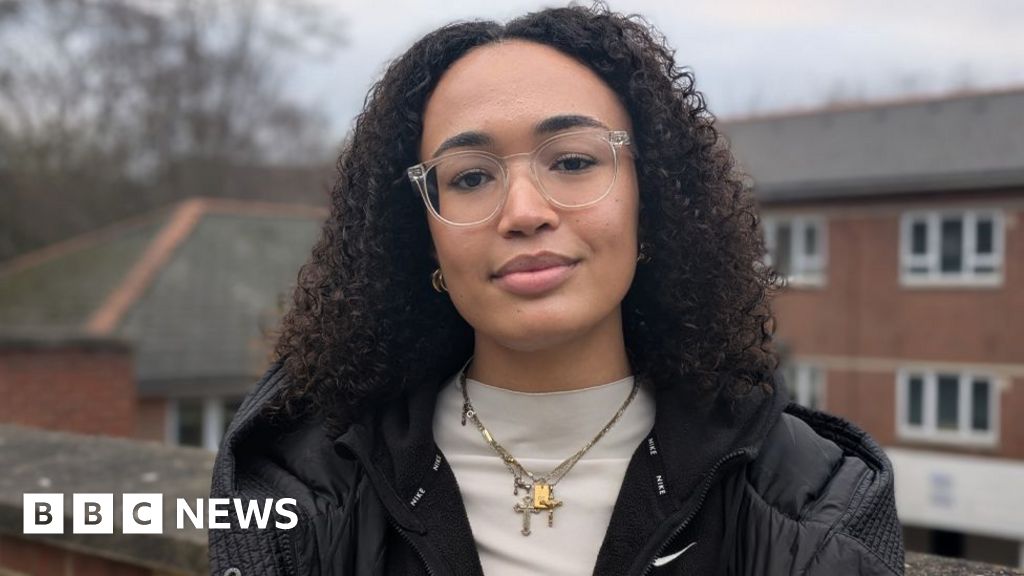BBC News Investigations
 BBC
BBCLives are being lost and families torn apart because of “woefully inadequate care” for people with eating disorders, according to a group of MPs.
The “alarming” rise in disorders such as anorexia and bulimia, over the past decade, has now become an “emergency”, the All-Party Parliamentary Group on Eating Disorders says in a report.
And greater awareness about different types of eating disorders and how they affect males and females of all ages and ethnicities is urgently needed.
NHS England acknowledged services were under extreme pressure but said all mental-health trusts now offered teenagers and young people early help.
‘Eating nothing’
At 13, Olimata Taal responded to issues at home by denying herself food and over-exercising.
It was the only thing she felt she could control.
“Eating healthier quickly became eating less, to eating nothing,” Olimata says.
“I remember literally feeling like a shell of a human.
“I remember having to take multiple baths a day, because my body literally couldn’t keep itself warm.”
Some teachers suspected something was wrong but failed to intervene.
And when Olimata first saw a GP, she was told to just “eat a muffin”.
‘Survivor’s guilt’
Now 27, Olimata says her mixed Gambian and English heritage added another layer of complexity to her experience.
“A huge part of African culture, in my experience, is about being strong, being strong-minded,” she says.
“I didn’t see anyone who looked like me going through an eating disorder.”
After she was diagnosed with anorexia, Olimata went on to receive consistent support from Child and Adolescent Mental Health Services (Camhs), which “saved her life”, although she still feels “survivor’s guilt”.
But because she did not want to lose that support, sometimes she felt no incentive to get better.
‘Grossly’ underfunded
The MPs spent six months listening to “harrowing” experiences from patients, bereaved families, clinicians and academics.
Eating disorders are often misunderstood and seen as a lifestyle choice affecting only white teenage girls, the report says.
In reality, they are serious but treatable mental illnesses.
The report refers to figures showing a growing number of people affected:
The report says services are “grossly” underfunded, there are barriers to accessing treatment and wide variations in care quality across the UK.
It calls for:
- a national strategy to properly support adults, young people, families and healthcare staff
- mandatory training so front-line workers such as teachers and nurses can spot different illnesses and offer help
“That’s a very good idea,” says consultant child-and-adolescent psychiatrist Dr Vic Chapman, who works for an eating disorders service run by Royal Free London.
“There is a big treatment gap for eating disorders.”

Mollie Campbell, 17, and her family fought for six years for a diagnosis of avoidant/restrictive food intake disorder (ARFID), where an individual avoids specific types of food.
Dismissed as a fussy eater, she was repeatedly refused help from eating disorder services because she did not match the criteria for more widely understood conditions.
“I thought the only way to get help was to eat even less, lose more weight and get sicker,” Mollie says.
Without specialist help, her desperate family regularly took Mollie to accident and emergency, with stabbing chest pains, which doctors said could be caused by her eating habits.
“I was in such a dark place where I saw no way out,” Mollie says.
But now, armed with more information on her condition, she is feeling positive and ready to start a new chapter at university in September.
‘Beyond broken’
One of the MPs, Labour’s Richard Quigley, has been through the “nightmare” of watching his own child battle an eating disorder.
“To watch someone who is bright and funny and clever just look lost and scared because there’s no treatment coming – you feel like you’re letting your child down,” he says.
As part of its long-term plans, NHS England says it has invested additional funding to improve waiting times for eating-disorder services and more than £1bn a year goes into the provision of community mental-health care for adults.
But Mr Quigley says services are “beyond broken”, far more investment is needed, which would save the NHS money in the long term, and specific training should be rolled out for GPs, dentists and carers.
“We’re not just talking about a half day of training here,” he says.
“We’re talking about days over a year to fully understand the nuances of, not just eating disorders, but the different types of eating disorders.”
Early interventions
NHS England mental-health director Claire Murdoch said there was “no doubt” eating disorder services were “under extreme pressure” but more than four out of every five children and young people who needed urgent treatment started it within one week.
“More work needs to be done, which is why every mental-health trust now offers evidence-based early interventions for 16–25-year-olds with an eating disorder,” she said.
The report also warns about the dangers of some clinics discharging patients when their body-mass index (BMI) is very low – less than 15 – indicating a severe eating disorder.
Campaigner Hope Virgo worries some people with long-term and complex eating disorders are being viewed as “untreatable” and “being sent home to die”.
However, some experts say there may be occasions where such patients could be discharged, as long as an appropriate level of intensive community or day-patient care is available.
A spokesperson for the Department of Health and Social Care in England said it was “unacceptable” that people with eating disorders did not receive the care they deserved.
“Clinical guidance is clear that decisions on discharge should never be made based solely on weight or BMI.”
As part of a 10-year plan, an additional 380,000 patients will be able to access talking therapies on the NHS, an extra 8,500 mental health staff will be recruited and there will be access to support in every school, the spokesperson said.



